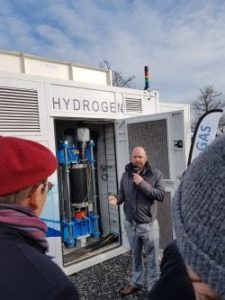What Happened to the Man Who Invented the Hydrogen Combustion Engine?

Introduction
The hydrogen combustion engine is a technology that has piqued the interest of scientists, engineers, and energy enthusiasts worldwide. But what happened to the man behind this revolutionary innovation? In this article, we will delve into the life and legacy of Roger Billings, the pioneering engineer and scientist who invented the hydrogen combustion engine, and examine how his work has impacted the energy and mobility landscape.
1. The Life of Roger Billings
Roger Billings was born on March 15, 1946, in Oklahoma, United States. From an early age, he showed a keen interest in science and technology. Throughout his life, Billings tirelessly dedicated himself to the research and development of advanced energy solutions.
2. The Hydrogen Combustion Engine
Roger Billings is widely recognized for inventing the hydrogen combustion engine in the 1970s. This engine used hydrogen as its primary fuel and had the potential to revolutionize the transportation industry by offering a cleaner and more efficient source of energy.
Technical Data: Billings’ hydrogen combustion engine achieved remarkable efficiency in converting hydrogen into mechanical energy, emitting only water vapor as a byproduct.
3. Impact on the Energy Industry
While Billings’ hydrogen combustion engine did not become mainstream in the automotive industry, his work laid the foundation for future research in the field of hydrogen fuel cells. These cells are used in modern hydrogen vehicles and power generation applications.
Technical Data: Hydrogen fuel cells based on Billings’ principles have proven to be highly efficient and clean, with zero emissions of polluting gases.
4. The Legacy of Roger Billings
Although Billings’ hydrogen combustion engine didn’t become an industry standard, his work in the field of clean and sustainable energy left a lasting impact. Billings continued his research and development in advanced energy technologies throughout his life.
5. Where Is Roger Billings Today?
Today, Roger Billings remains an influential figure in the research of advanced energy technologies. He is the founder of companies and organizations dedicated to promoting clean and sustainable energy, and his work has inspired generations of scientists and engineers to continue exploring innovative solutions to the world’s energy challenges.
Conclusion
Roger Billings, the man who invented the hydrogen combustion engine, left a significant legacy in the quest for cleaner and more efficient energy sources. While his engine didn’t become the norm, his work influenced the development of hydrogen fuel cell technologies and raised awareness about the importance of sustainable energy. Billings’ story serves as a reminder of how innovation and dedication can open new doors in the pursuit of more sustainable energy solutions for our world.

























